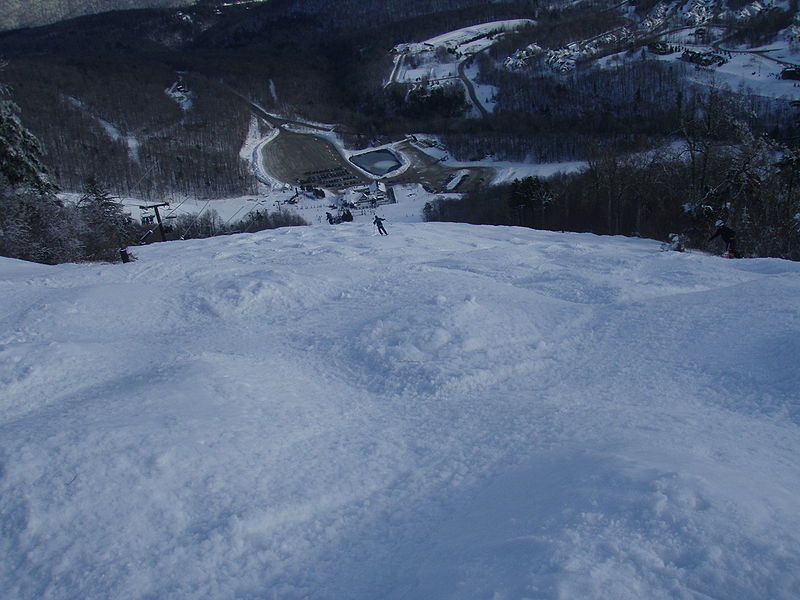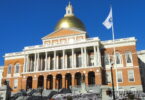By Diana Leane
BU News Service
BOSTON — New England skiers trek to nearby slopes this winter to enjoy the cold weather and ideal winter sports conditions, but the snow under their skis may be anything but natural. Winter sports complexes are already preparing for an oncoming threat: a warmer climate.
As the earth warms, snowfall is predicted to become more unreliable in the region. Winter tourism activities contributed $269 million to Massachusetts and $12 billion to the U.S. economy in 2009 and 2010 alone, according to a study by Protect Our Winters and the Natural Resources Defense Council.
The study projects the average number of days with snow cover in New England to decline by 50-75%, depending on greenhouse gas emissions. From 1999 to 2010, the downhill ski industry lost an estimated $1 billion in revenue between low and high snowfall years.
Elizabeth Burakowski, a research assistant professor at the University of New Hampshire, co-authored the study and said in the northeastern United States, the ski areas’ biggest adaptation has been snowmaking. Ski resorts began making their own snow around the 1970s, she said, and the technology plays a crucial role in light of climate change.
“At most resorts, it’s not uncommon to have well over 95% of the mountain covered in snowmaking,” Burakowski said.
Blue Hills Ski Area, located near Boston, has noticed fewer visitors on warmer winter days, according to general manager Molly Ross.
Blue Hills Ski Area has made snow throughout its history and relies on the snowmaking technology to alleviate the effects of warmer temperatures, Ross said. She added that for at least the last five years, Blue Hills has aimed to increase its snowmaking capacity each season.
Customers may not know about Blue Hills’ snowmaking capabilities, Ross said, so the ski area centers its marketing around its man-made snow.
“In years where there isn’t as much natural snow, it is harder to convince people that we do have snow here,” Ross said. “A lot of times people look in their backyards, and if they don’t see snow they don’t think that we have snow here.”
Blue Hills’ busiest days fall after a major snowstorm, she noted, and the ski area does better in years with more snowfall.
Kristin Kelleher, former programs director at the Boston-based Climate Action Business Association, said snowmaking is an energy-intensive process. At a macro level, she said, that means society uses more energy and contributes to greater fossil fuel use.
“It’s very similar to the concept of when we have a super hot day here, we turn on our air conditioner,” Kelleher said. “When you’re creating extra snow, or when you’re turning on that air conditioner, you’re actually using more and more energy.”
Developments in technology make snowmaking more efficient and cheaper, Burakowski noted, and ski areas need less energy, water and time to cover more acreage. However, she said, the businesses still devote significant money and energy to snowmaking because they must make higher quantities of snow with warmer weather.
“It still remains a really big and really large chunk of their bottom line,” Burakowski said.
Burakowski said many resorts are turning to renewable energy, such as solar energy and wind turbines, to offset the costs and energy usage. The resorts’ green initiatives can have far-reaching effects beyond their businesses, she added.
“For them to lead by example and do their part, I think that says a lot to their clientele,” Burakowski said. “That encourages their clientele to do their part, too.”
Burakowski said skiers, snowboarders and snowmobilers will feel the changes in climate that the winter sports industry is addressing soon, if they have not already.
Increasingly warmer winters will affect people’s perception of the Northeast region, she said, and they may experience solastalgia — a combination of “solace” and “nostalgia” — which describes distress from environmental changes.
“There are certainly people who hate winter in the New England area,” said Burakowski, who is a skier and snowboarder. “But at the same time, there are many of us around who find those [warm winter] days to be just oddly warm and uncomfortably warm in a way that evokes this sense of your environment changing beyond, and you feel powerless to protect it.”
She said she hopes people who participate in winter sports and feel these effects can understand the personal impact climate change will have on them.
“Sometimes climate change can be really hard to grasp, or to understand or even recognize in your own backyard,” Burakowski said. “And I hope this provides a connection to folks that may have not realized it before — that it is actually affecting them in a very personal way.”






[…] Snowmaking: http://bunewsservice.com/new-england-ski-areas-face-grim-forecast-as-climate-change-brings-warmer-wi… […]